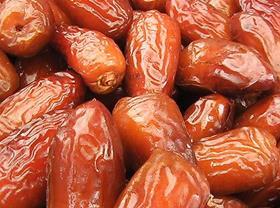
Dates are an important fruit in the Middle East, having been cultivated there for over 7,000 years and become a staple in many of the region’s cuisines. Known for its sweetness and fibre, iron, magnesium and potassium content, the fruit is highly versatile, eaten as is, stuffed with cheese or nuts, or used as an ingredient in both sweet and savoury dishes.
Dates are a hugely popular item for the approximately 1.9bn Muslims now starting Ramadan. For a month, Muslims observing the fast will not eat or drink between dawn and sunset, and the traditional way to break the fast during Ramadan is with dates.
“In this Holy Month of Ramadan, Muslims traditionally break their fast with dates to emulate the Prophet,” the National reported.
According to food site The Spruce Eats, “the meal that breaks the fast is called Iftar and it is begun by eating three dates because tradition holds that the prophet Mohammed broke his fast with three dates and water.”
“Because the Ramadan fast lasts for so many hours during the day,” the same source continues, “the body can develop mild health problems such as headaches, low blood sugar and lethargy.”
The ease with which they are digested and long list of nutrients make dates an ideal food for the recommencement of eating after sunset.
From an economic perspective, dates are a multi-billion-dollar industry. In 2018, the global date market was valued at US$13bn and is forecast to exceed US$18bn by 2023. The biggest producers are Egypt with almost 1.7m tonnes, Iran with 1.07m tonnes and Algeria with 1.03m tonnes, while the leading exporters in value terms are Tunisia at US$220m, Saudi Arabia at US$211m and Iran at US$172m.



